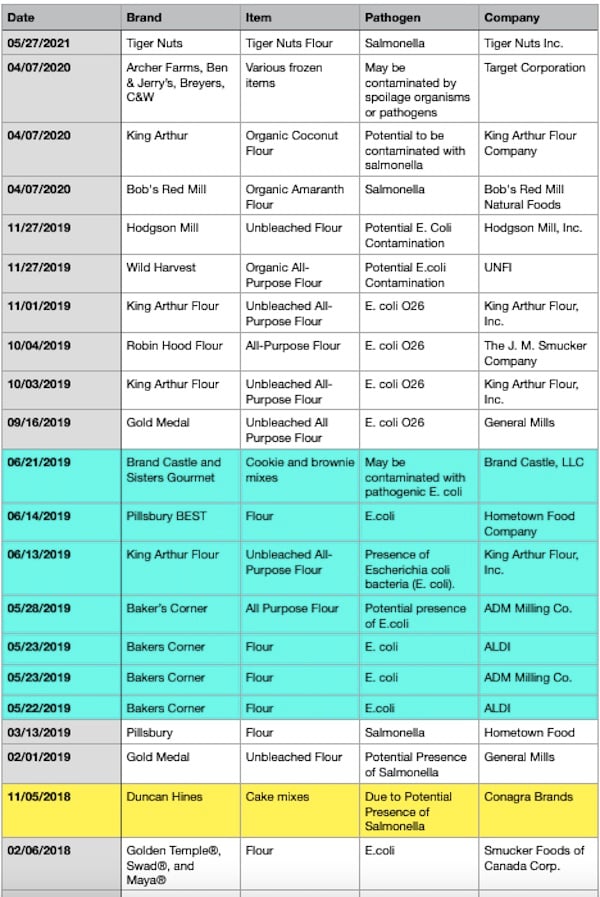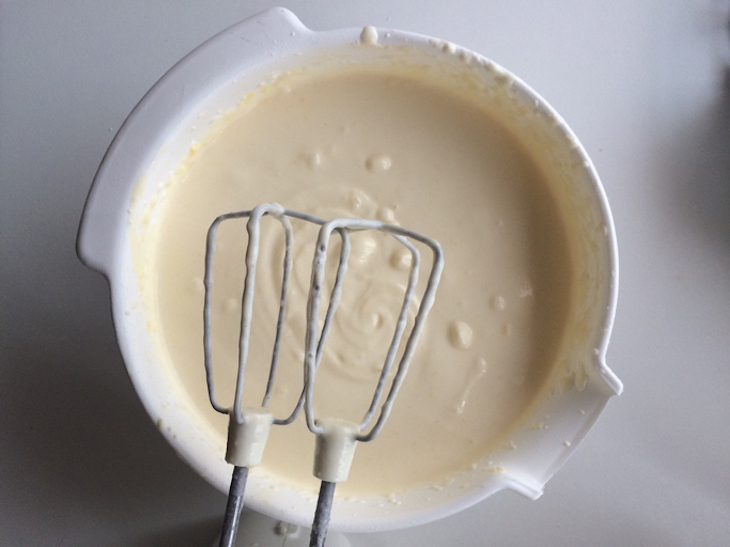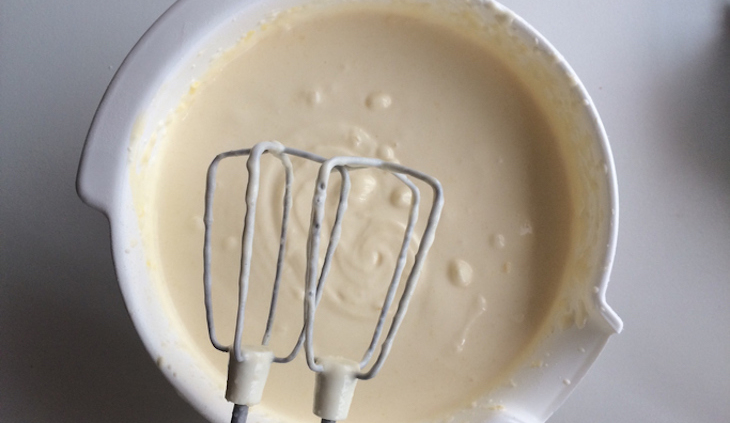As a cake mix E. coli outbreak unfolds, some consumers are wondering how common is bacterial contamination of cake mix and flour? An examination of recalls posted on the U.S. Food and Drug Administration’s (FDA’s) website reveals that since 2018 there have been 21 Salmonella or E. coli recalls for flour or cake mix. Some of them were issued in connection with outbreaks that occurred during that time period.

Recalls highlighted in blue-green are linked to a 2019 E. coli outbreak. The recall highlighted in yellow was linked to a 2018 Salmonella outbreak.
How Does Flour Get Contaminated?
Flour is made from wheat and other grains which, like all food grown outdoors, can be exposed to bacteria in soil or irrigation water. Grains can also become contaminated in grain elevators or flour mills where humid conditions promote bacterial growth. Flour is a raw ingredient, so if it is contaminated it will stay that way until it is cooked or baked to a temperature that can kill Salmonella and E. coli (165˚F).
It only takes a microscopic amount of bacteria to cause illness, so just a taste or two of contaminated cookie dough or cake batter is enough to cause severe illness. Symptoms of food poisoning from Salmonella and E. coli include abdominal cramps and diarrhea that can be bloody. These symptoms usually develop within one to three days of exposure.
2018 Duncan Hines Cake Mix Salmonella Outbreak
In 2018, a Salmonella outbreak linked to Duncan Hines cake mixes sickened seven people in five states. Maryland and Ohio each reported two cases. Florida, Missouri, and Wisconsin each reported one.
On November 5, 2018, ConAgra Brands issued a recall of four varieties of Duncan Hines cake mix after Oregon health officials found Salmonella Agbeni in a box of Duncan Hines Classic White Cake Mix. The recall included the Classic White cake mix, Classic Butter Golden, Signature Confetti, and Classic Yellow cakes mixes.
2019 ADM Milling Flour E. coli Outbreak
In 2019, an E. coli O26 outbreak linked to flour produced by ADM Milling sickened 21 people in nine states. Recalls were issued for a variety of flour brands milled by ADM including Pillsbury Best Bread Flour, King Arthur flour, ALDI Baker’s Corner flour, and Brand Castle cookie and brownie mixes.
The people sickened ranged in age from 7 to 86 years old. They reported onset-of-illness dates ranging from December 11, 2018, to May 21, 2019.
The number of cases reported from each state were: California (1), Connecticut (1), Massachusetts (2), Missouri (1), New Jersey (1), New York (7), Ohio (5), Pennsylvania (2) and Rhode Island (1).

2021 E. coli O121 Cake Mix Outbreak
The 12-state E. coli O121 outbreak has sickened 16 people seven of whom have been hospitalized. One person has developed hemolytic uremic syndrome (HUS), a form of kidney failure associated with some E. coli infections.
Health officials are still working to identify the cake mix brand or brands asscoaited with this outbreak.
The outbreak patients range in age from 2 to 73 years old. The number of illnesses reported from each state is as follows: Illinois (2), Indiana (1), Iowa (2), Massachusetts (1), Michigan (1), Nebraska (2), Ohio (2), Oregon (1), South Carolina (1), Utah (1), Virginia (1), and Washington (1).
Food Poisoning Lawsuit Consultation
Pritzker Hageman food poisoning lawyers have represented clients in every major E. coli and Salmonella outbreak in the U.S. If you were sickened in this outbreak and would like a free consultation with an experienced food poisoning lawyer, you can reach us by calling 1-888-377-8900, sending a text to 612-261-0856, or by completing the form below. There is no obligation and you don’t pay us unless we win.

